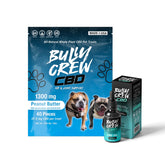MCT oil for dogs is quickly becoming a popular supplement for promoting brain and heart health in our furry friends. Medium-chain triglycerides (MCTs) have long been a key component in human health, especially with the widespread use of coconut oil. However, when it comes to our pets, it's important to remember that what works for us doesn't always work the same way for dogs—just like how chocolate can harm them!
Recent research has revealed the specific benefits MCTs can offer dogs, and not all MCT oils are created equal. While MCTs are commonly known for their role in human diets, studies now suggest that medium-chain triglyceride oil for dogs can be a game-changer for their health, mainly when supporting brain function and cardiovascular well-being.
But what do the latest scientific findings reveal about the effectiveness of MCT oil for dogs? Can dogs have MCT oil, and how can it help improve their health? This blog will dive deeper into the facts and explore how MCT oil can support your dog's overall wellness.
What Is MCT Oil For Dogs?

Medium-chain triglycerides (MCTs) are a type of fat found in coconut oil, palm oil, and some dairy products. What makes MCTs unique is the length of their carbon chains. MCTs have between 6 to 12 carbon atoms, which is shorter than long-chain triglycerides (LCTs), which have more than 12 carbon atoms. On the other hand, fatty acids with fewer than 6 carbon atoms are known as short-chain fatty acids (SCFAs). This structural difference sets MCTs apart and gives them unique health benefits.
MCT Oil vs Coconut Oil: What's The Difference?

Coconut oil contains both medium-chain fatty acids (MCTs) and long-chain fatty acids (LCTs). However, MCT oil is made from 100% pure MCTs, specifically those that are beneficial for health. One key difference is that MCT oil can be made up entirely of capra fatty acids, like caprylic acid. In contrast, coconut oil contains about 48% lauric acid and only around 15% caprylic and capric acids combined. Lauric acid is close to being a long-chain fatty acid and may even contribute to inflammation. In contrast, Capra fatty acids, like caprylic acid, are known to help burn fat and reduce inflammation, so they're considered the more practical option as the kind of MCT oil good for dogs.
Related: Best Natural Remedies for Dog Ear InfectionsThe Benefits Of MCT Oil For Dogs - Is MCT oil good for dogs?
Research on MCT oil for dogs is still in the early stages, so we still need to get all the answers. However, the initial studies show much promise, particularly for supporting a dog's brain and heart health. So far, most of the benefits fall into three key areas.
MCT Oil Helps Slow Dementia in Older Dogs

MCT oil can be a game changer for senior dogs dealing with canine cognitive disorder (CCD), also known as "doggy dementia." Studies have shown that MCT oil helps improve memory and learning in older dogs, supporting brain function as they age.
So, how exactly does MCT oil help your dog's brain? For starters, it increases the amount of phospholipids in the brain, which are essential fats that protect brain cells. MCT oil also helps omega-3 fatty acids like DHA (docosahexaenoic acid) cross the blood-brain barrier, which is vital for brain health in both puppies and older dogs.
What makes MCT oil so effective is that, unlike other fats, it easily passes through the gut, enters the bloodstream, and is quickly converted into ketones by the liver. Ketones are an alternative energy source for the brain, especially helpful as dogs age and struggle to process glucose. As their ability to use glucose declines, ketones provide the brain with the fuel it needs to stay sharp and healthy.
MCT oil for dogs with seizures
MCT oil has become a promising supplement for dogs with seizures, particularly those suffering from epilepsy. Studies show that it can help reduce the frequency of seizures in some dogs. In a 2021 study by Berk et al., dogs with epilepsy that were fed a diet containing 9% MCTs not only had fewer seizures but also showed significant improvements in their cognitive abilities. These dogs became more trainable, had better memory, and displayed improved problem-solving skills. This makes MCT oil a powerful, natural option to help support dogs with seizures.
MCTs and Canine Heart Health
Medium-chain triglycerides (MCTs) are proving to be beneficial for canine heart health, especially in slowing the progression of heart disease. One common heart condition in dogs is myxomatous mitral valve disease (MMVD), which affects many breeds, particularly the Cavalier King Charles Spaniel. In fact, some American bloodlines of this breed have up to a 100% chance of developing MMVD by age 10.
Research suggests that MCT oil can slow the advancement of MMVD by providing the heart with an alternative fuel source, much like how MCTs help the brain in dogs with dementia.MCTs and the ketones they produce can reduce damage caused by free radicals and help the heart function more efficiently. This makes MCT oil a promising supplement for supporting heart health in dogs, particularly those at risk for MMVD.
What to Look for in MCT Oil for Dogs
When choosing the right MCT oil for your dog, it's important to find one that provides the best benefits without harmful additives. Here are some tips to guide you in making the best choice:
- Choose the Right Fatty Acids: Look for MCT oil free from lauric acid. A blend of caprylic and capric acids is the most digestible and beneficial for your dog.
- Opt for Sustainably Sourced Oils: MCT oil comes from coconut and palm oil, which can contribute to deforestation. Always choose sustainably sourced oils to support eco-friendly practices.
- MCT Oil over Powder: Choose liquid MCT oil rather than powder, as powders may contain starches that add unnecessary carbohydrates to your dog's diet.
- Check the Label: Avoid oils with artificial flavors, colors, or additives. Opt for pure, natural products.
- Choose Trusted Brands: Avoid cheap or unreliable brands that might use too much lauric acid. Always do your research, read reviews, and ensure the brand you select has a good reputation.
How Much MCT Oil Should You Give Your Dog?

Slowly introducing MCT oil to your dog's diet is essential to avoid upsetting its stomach. Generally, MCT oil should make up about 6% to 9% of your dog's total diet, but you'll also need to consider the amount of fat they're already getting from their regular food. To keep your dog's diet balanced, aim for a total fat content of around 10% to 15%, which includes MCT oil and essential omega-3s. Constantly monitor your dog for any signs of discomfort and adjust the amount accordingly.
MCT oil for dogs side effects
MCT oil can be a great supplement for dogs, but it's important to use it carefully to avoid side effects. Overuse may cause digestive upset like diarrhea or vomiting, weight gain due to its high-calorie content, or, in rare cases, allergic reactions. Dogs with a history of pancreatitis should avoid it unless a vet advises. To minimize risks, start with small doses, monitor your dog's response, and choose pet-safe MCT oil. With proper use, MCT oil can support your dog's health effectively.
Conclusion
Early research on MCT oil for dogs looks very promising. It may help support brain function in older dogs, improve heart health, and even reduce seizures in dogs with epilepsy. Adding a safe amount of MCT oil to your dog's food can be a great way to enhance their overall health. Just remember, moderation is key—it's important not to overdo it. Always start with small amounts and consult with your vet to find the right balance for your furry friend.
Our Products:








